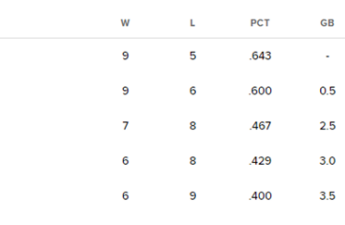
Google “I didn’t write the headline“. Make sure you use the quotations. Or I’ll do it for you.
30,200 hits for disavowal of the headline content, almost entirely by the actual authors of the post or article that was being written. Removing the conjunction in the statement and replacing it with whole words tacks on an additional 9,240 hits.
Removing the quotations, of course, gets you like 26.4 million hits, but searches without quotations are pretty irrelevant. However, the top hit is an article in the Washington Examiner, which Wikipedia tells me is some sort of wonky weekly magazine, which boldly proclaims “Let’s stop arguing with headlines that the writer didn’t write“.
This fact alone is not new to or unique to the world of the Internet. I used to write a weekly column for the Seaside Signal when it was still an independent paper and occasionally had some serious frustrations with my primary editor’s (Shelby Case) taste in headlines for me. One that still stands out in my mind was one of my early columns about children being picky eaters (highly autobiographical, of course) which he titled Can’t Get Johnny to Eat? Maybe This Kid Can Explain. In retrospect, I can only imagine that he need to fill some column inches, since the high point-size of the font made the headline occupy nearly as much space as the entire article. But it was just so cumbersome. In further retrospect, though, I guess it had roughly the shape of the current series of Buzzfeed articles traversing the web.
And, frankly, I was probably no less guilty during the brief time I was in the position to write headlines as an editor of a paper, that being the Opinion section of the Advocate, which is Albuquerque Academy’s monthly fishwrap. (Apparently they have a Facebook page.) I definitely titled my screed on Veteran’s Day US Honors Violence and, more infamously, warped Ryan Duryea’s piece on kids being encouraged to show more emotion into Six-Year-Olds Should Kiss. So I am perhaps among the last person who should be calling out this phenomenon, realistically.
That said, someone’s got to do it. We are reaching Peak Absurd Headlines in this Internet, people. Not only does my Facebook feed clutter almost endlessly with paid advertising for these kinds of sites hoping to “go viral” like it’s “going to get milk at the store” but dozens of friends will daily post something that says, roughly, “I promise the content is good even though the headline is horrendous.” And I think it’s probably reasonable to blame Facebook, a site that I generally think has offered a lot of good things to our lives, for this trend.
See, the Internet used to be a lot more free-rangey. Now, Facebook has kind of made the Internet into one giant scrolling newspaper that we all subscribe to, though, granted, in our own individual local spheres. For users, which are increasingly everyone, Facebook is the primary stop on the Internet as a portal to everything else they’re going to read and see, at least other than their e-mail Inbox. But in the golden age of blogging and the 1.0 years of the web, people would wander more, using search engines and going from link to link and reading a few dedicated people in their sphere who weren’t mostly regurgitating content that was spewed by large conglomerate clearing-houses of information. Like everything in the last fifty years in America, the recent Internet has been a process of centralizing and consolidating power, influence, and wealth into the hands of a few.
And one of the best tools for that is these ridiculous headlines. Unlike even the attention-grabby headlines of Case c. 1991 or Clayton c. 1996, these headlines almost universally predict your emotional reaction. And I think this works for two reasons: 1. We want things to excite our emotions and 2. If we are resentful of the headline, we take an oppositional view of the emotional reaction and thus want to prove it wrong. Either of these reactions, of course, elicit the desired outcome, which is a click.
I’m not by any stretch the first person to observe this phenomenon of a “click-bait headline”, which itself clocks in at 171,000 Google hits with the quotation marks (!). But awareness is only the start. The problem is that we have to go back to promoting and desiring actually good content, not just empty traffic and empty content.
Buzzfeed is like fast food. It’s well advertised with colorful relatable stuff, it’s fast, and it’s everywhere. But longer works and more thoughtful or creative content is like a thoroughly-prepared locally-sourced well-balanced meal. It’s nutritious but it takes a while. It’s not flashy, but you feel a lot better for ingesting it. And similarly, the goals of the fast food producer are just to get money to generate more fast food to get more money in an upward spiral. Whereas the goals of a thoughtful cook are to present a good experience for those they are preparing the meal for. Virality used to be a reflection of some really intriguing content, not an end to itself.
In the days of blogging and long e-mails, content was what got people excited. Sharing was something that people did with thought and care behind it, not as an auto-click button that connected them to one of 3-5 pre-approved platforms for contacting their friends automatically. And when it’s the content that matters, headlines are just window-dressing. Somehow, even within the narrow timeframe of the Internet, the sites that have “won the web” have narrowed our attention spans and attention to detail to the point where the headline becomes most of what matters.
Unlike many things I make recommendations about in my preachier posts, this is something you probably have the wherewithal and access to do something about directly. After all, we are all citizens of the Internet and spend a bit of each day clicking, perusing, and maybe even (well definitely, if you’ve gotten this far) reading. Go back to sharing the content, or even to blogging and e-mailing! Or at the very least, block some of the most obnoxious click-baiters from your Facebook feed.
I won’t do it again, promise.


